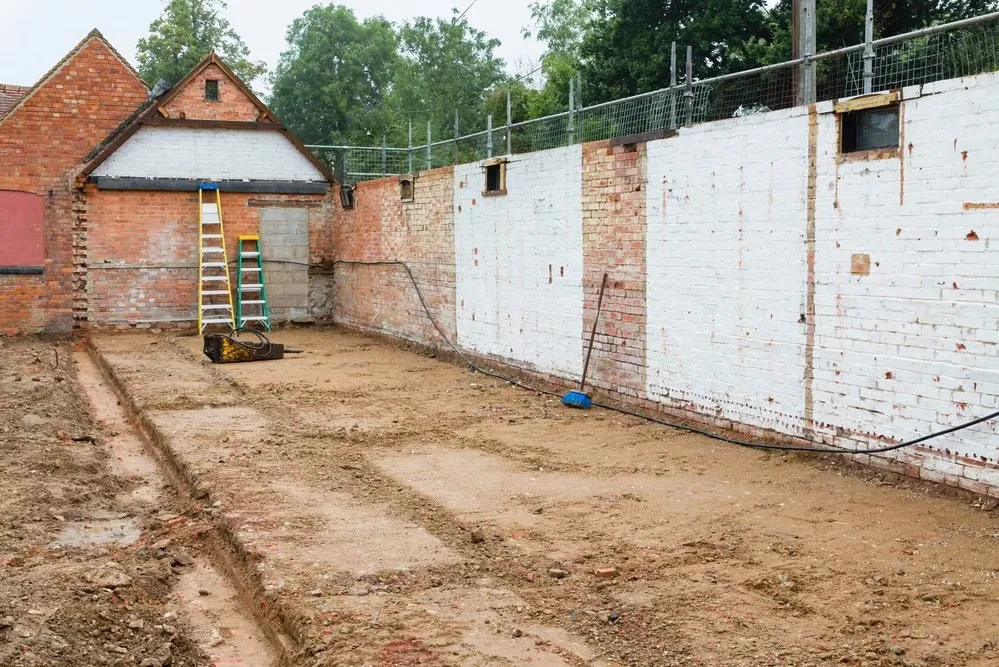Here’s what you need to know about laying the foundations for your house extension:
Understand the different types of foundations: There are several types of foundations to choose from, including strip, raft, and piled. The type you choose will depend on your soil type, the weight of your extension, and the local building codes.
Conduct a soil survey: A soil survey will help you determine the stability of the soil on your property, which will impact the type of foundation you can use. You should consult with a professional geotechnical engineer to conduct a soil survey.
Obtain permits: Before you begin any construction work, you’ll need to obtain the necessary permits from your local building authority. They will require detailed plans of your foundation design to ensure they meet the code requirements.
Hire a professional builder: Laying foundations is a complex and technical process. We strongly recommend hiring a professional builder with experience in foundation laying. They will know how to properly excavate, install the foundation, and ensure it is level and square.
Prepare the site: Before laying the foundations, the site must be cleared of debris, trees, or vegetation. If it is necessary to remove any trees, you may need to seek permission from your local council.
Install drainage and utilities: If you plan to have plumbing, electricity or gas in your extension, it’s advised to ensure these are installed in the foundation. This can be a crucial step, as once the foundation is laid, it can be challenging to make changes.
Monitoring and inspections: Once the foundation is completed, it will need to be monitored and inspected regularly to ensure its stability. This will include checks for settling or movement, which could indicate a problem with the foundation.
What problems can happen during the foundation-laying stage?
Several common risks are associated with house extension work, so you should protect the whole build with site insurance. Some of the most common risks include:
Accidents and injuries: Construction sites can be hazardous places, and there is always a risk of accidents and injuries. This is especially true when working at heights or with heavy machinery.
Damage to neighbouring properties: Depending on the location of your property, your house extension work could cause damage to the neighbouring properties. Accidental damage like breaking windows and vehicles and causing cracks in their walls are common possibilities.
Weather and natural disasters: Weather and natural disasters like heavy rain, floods, fires, and strong winds could cause damage to your construction project if proper precautions are not taken.
Theft and vandalism: Construction sites can be attractive targets for thieves and vandals, and your project may be at risk of being damaged or stolen.
Construction delays: Delays in construction can be costly and may lead to additional expenses. Additionally, a delayed construction process could significantly push out the completion date; in the meantime, the site and the construction could pose a liability to others.
To protect against these risks, it’s important to have site insurance which will provide coverage in case of any unforeseen events that could impact your construction project. Site insurance will give you peace of mind and protect your investment throughout construction.
How long do foundations take to complete?
The construction timeline for laying foundations depends on various factors, such as the size of the building, the type of foundation, and the soil condition. Typically, foundation construction can take two to four weeks to complete, but it can also take more or less time, depending on the nature of the project.
For example, a small house extension may only require a few days to lay the foundations. However, completing the foundation work for larger projects, such as a multi-story extension, may take several weeks.
The weather conditions can also affect the foundation construction timeline, with inclement weather such as heavy rain or snow causing delays in construction work, so it’s often advised to start your foundation work between Spring and Autumn.
Discussing the timeline for foundation construction with your contractor before work begins is essential. The foundation stage is a critical aspect of any construction project, so it is important to ensure that the work is not rushed and that enough time is allocated to complete the foundation work to a high standard.
Overall, whilst foundation construction can take several weeks to complete, ensuring the foundation is well-built will ensure your home or building stands firm and will last for years.
Associated article: https://www.selfbuildzone.com/post/2019/05/10/foundations-and-footings-what-lies-beneath

